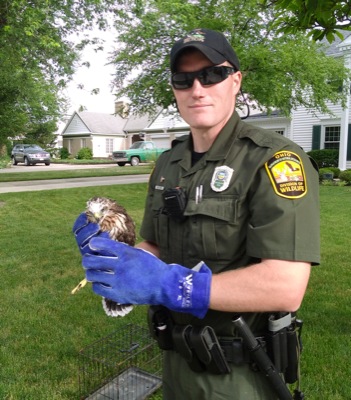Wednesday, June 20th, 2018
Local man's eagle eye spots raptor in trouble
By Nancy Allen

Submitted Photo
Mercer County Wildlife Officer Brad Buening holds a juvenile Cooper's hawk that he picked up on Tuesday morning in Celina before taking it to a wildlife rehabilitation center near Troy.
CELINA - A young Cooper's hawk is rehabbing at a nature center after an observant Celina man noticed the bird hopping across city streets.
Gary Smith said he was walking on Johnson Avenue near Ash Street on Tuesday morning when he noticed the young raptor on the ground and unable to fly.
"He was in the road, and I followed it into a yard, and another gentleman and I were trying to keep the bird in the yard," Smith said, adding he feared it would be struck in traffic.
Smith contacted the county sheriff's office, which dispatched Mercer County Wildlife Officer Gary Buening to the scene.
"He came and put his gloves on and got a net," Smith said of Buening. "He shooed the bird into the net and reached under it and put him in a cage."
Buening said he did not see any parents or nestmates around. The area is highly populated and busy with traffic, so he took the bird to Brukner Nature Center near Troy. It will be raised and eventually released, perhaps back into Mercer County, Buening said.
"I believe it was unable to fly yet. It didn't have its flight feathers," Buening said. "It's not uncommon that they can't fly yet when they leave the nest. The adult birds feed them on the ground."
Buening said Smith did the right thing by contacting a wildlife specialist.
"We never recommend the public intervene," he said, adding that Cooper's hawk parents can be aggressive when protecting their young.
Buening said Cooper's hawks have adapted well to city living and are a common site in town. Their favorite food is other birds, so they tend to hang around bird feeders, he said.
"When you are feeding the mourning doves and sparrows, they seem to do pretty well with that," he said.
They attack quickly. A slow mourning dove doesn't stand a chance, Buening said.
According to the National Audubon Society, Cooper's hawks usually hunt by stealth, moving from perch to perch in dense cover, listening and watching, then putting on a burst of speed to overtake prey. They also sometimes cruise low over the ground to surprise their prey from behind.
In addition to feeding on medium-sized birds, they also feed on small mammals such as chipmunks, tree squirrels, ground squirrels, mice, bats and sometimes reptiles. Other common names for the species include chicken hawk, big blue darter, hen hawk, Mexican hawk, quail hawk, striker and swift hawk.
Smith, who is interested in wildlife, said it "was a treat" to find the bird and help.
"It was pretty cool this morning and to be part of it," he said.




